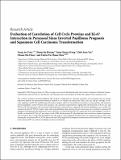Evaluation of Correlation of Cell Cycle Proteins and Ki-67 Interaction in Paranasal Sinus Inverted Papilloma Prognosis and Squamous Cell Carcinoma Transformation
Author(s)
Tsou, Yung-An; Huang, Hung-Jin; Wang, Tang-Chuan; Tai, Chih-Jaan; Chen, Chuan-Mu; Chen, Calvin Yu-Chian; ... Show more Show less
Download2738.2014.634945.pdf (4.037Mb)
PUBLISHER_CC
Publisher with Creative Commons License
Creative Commons Attribution
Terms of use
Metadata
Show full item recordAbstract
The recurrent sinonasal inverted papilloma (IP) could be transformed to sinonasal squamous cell carcinoma. We use protein expression patterns by immunohistochemical method to see whether the expression of p53, p16, p21, and p27 belongs to cell-cycle-regulators and PCNA (proliferating cell nuclear antigen) and Ki-67 the proliferation markers in sixty patients with sinonasal inverted papilloma, and 10 of them with squamous cell carcinoma transformation. Significantly elevated levels of Ki-67, p27, and PCNA in IP with squamous cell carcinoma transformation of sinonasal tract compared with inverted papilloma were revealed. No variation of p16, p21, PLUNC (palate, lung, and nasal epithelium clone protein) and p53 expression was correlated to sinonasal IP malignant transformation by multivariate survey. However, we found elevated PLUNC expression in IPs with multiple recurrences. Finally, we found that PCNA, p27 may interact with CDK1 which promote IP cell proliferation and correlate to sinonasal squamous cell carcinoma. Ki-67 could work throughout the cell cycles to cause malignant transformation. In conclusion, this is a first study showing the correlation of Ki-67, PCNA interacted with CDK1 might lead to malignant transformation. Elevated PLUNC expression in the sinonasal IPs was related to multiple recurrences in human.
Date issued
2014-06Department
Massachusetts Institute of Technology. Computational and Systems Biology ProgramJournal
BioMed Research International
Publisher
Hindawi Publishing Corporation
Citation
Tsou, Yung-An, Hung-Jin Huang, Tang-Chuan Wang, Chih-Jaan Tai, Chuan-Mu Chen, and Calvin Yu-Chian Chen. “Evaluation of Correlation of Cell Cycle Proteins and Ki-67 Interaction in Paranasal Sinus Inverted Papilloma Prognosis and Squamous Cell Carcinoma Transformation.” BioMed Research International 2014 (2014): 1–16.
Version: Final published version
ISSN
2314-6133
2314-6141